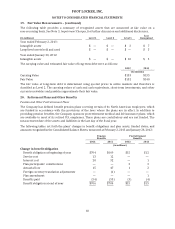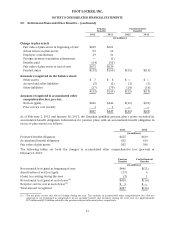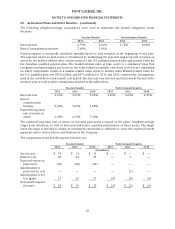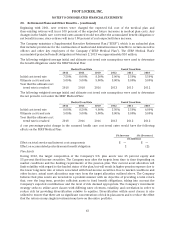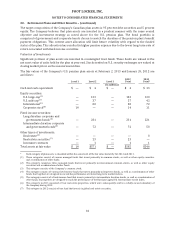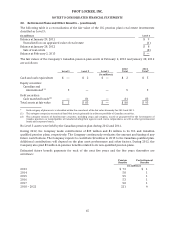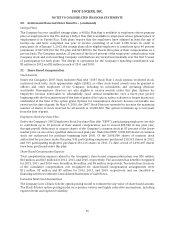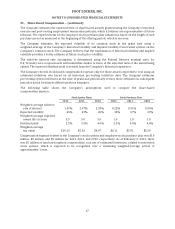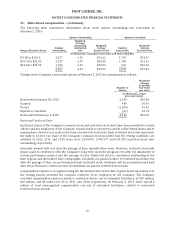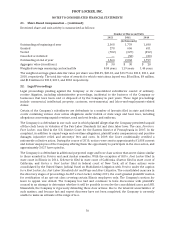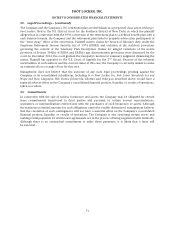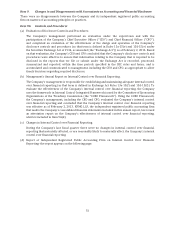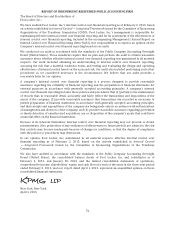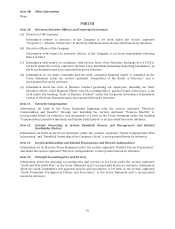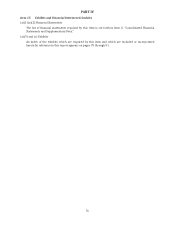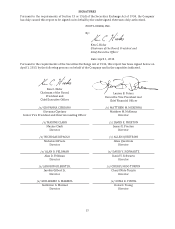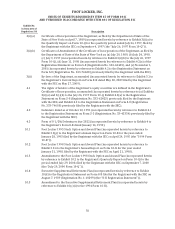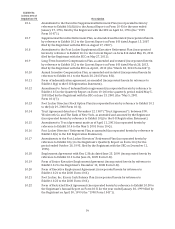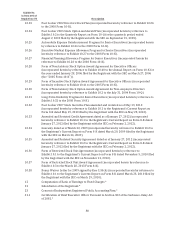Foot Locker 2012 Annual Report Download - page 90
Download and view the complete annual report
Please find page 90 of the 2012 Foot Locker annual report below. You can navigate through the pages in the report by either clicking on the pages listed below, or by using the keyword search tool below to find specific information within the annual report.
FOOT LOCKER, INC.
NOTES TO CONSOLIDATED FINANCIAL STATEMENTS
21. Share-Based Compensation − (continued)
Restricted share and unit activity is summarized as follows:
Number of Shares and Units
2012 2011 2010
(in thousands)
Outstanding at beginning of year 2,068 1,759 1,680
Granted 278 686 651
Vested (782) (327) (492)
Cancelled or forfeited — (50) (80)
Outstanding at end of year 1,564 2,068 1,759
Aggregate value (in millions) $ 30 $ 30 $ 20
Weighted-average remaining contractual life 0.84 years 1.19 years 1.44 years
The weighted-average grant-date fair value per share was $30.89, $20.18, and $13.75 for 2012, 2011, and
2010, respectively. The total fair value of awards for which restrictions lapsed was $8 million, $4 million,
and $10 million for 2012, 2011, and 2010 respectively.
22. Legal Proceedings
Legal proceedings pending against the Company or its consolidated subsidiaries consist of ordinary,
routine litigation, including administrative proceedings, incidental to the business of the Company or
businesses that have been sold or disposed of by the Company in past years. These legal proceedings
include commercial, intellectual property, customer, environmental, and labor-and-employment-related
claims.
Certain of the Company’s subsidiaries are defendants in a number of lawsuits filed in state and federal
courts containing various class action allegations under federal or state wage and hour laws, including
allegations concerning unpaid overtime, meal and rest breaks, and uniforms.
The Company is a defendant in one such case in which plaintiff alleges that the Company permitted unpaid
off-the-clock hours in violation of the Fair Labor Standards Act and state labor laws. The case, Pereira v.
Foot Locker, was filed in the U.S. District Court for the Eastern District of Pennsylvania in 2007. In his
complaint, in addition to unpaid wage and overtime allegations, plaintiff seeks compensatory and punitive
damages, injunctive relief, and attorneys’ fees and costs. In 2009, the Court conditionally certified a
nationwide collective action. During the course of 2010, notices were sent to approximately 81,888 current
and former employees of the Company offering them the opportunity to participate in the class action, and
approximately 5,027 have opted in.
The Company is a defendant in additional purported wage and hour class actions that assert claims similar
to those asserted in Pereira and seek similar remedies. With the exception of Hill v. Foot Locker filed in
state court in Illinois in 2011, Echeverria filed in state court of California, Ghattas filed in state court of
California, and Cortes v. Foot Locker filed in federal court of New York, all of these actions were
consolidated by the United States Judicial Panel on Multidistrict Litigation with Pereira under the caption
In re Foot Locker, Inc. Fair Labor Standards Act and Wage and Hour Litigation. The consolidated cases are in
the discovery stages of proceedings. In Hill v. Foot Locker, in May 2011, the court granted plaintiffs’ motion
for certification of an opt-out class covering certain Illinois employees only. The Company’s motion for
leave to appeal was denied. The Company has had and continues to have discussions with plaintiff’s
counsel in an attempt to determine whether it will be possible to resolve the consolidated cases and Hill.
Meanwhile, the Company is vigorously defending these class actions. Due to the inherent uncertainties of
such matters, and because fact and expert discovery have not been completed, the Company is currently
unable to make an estimate of the range of loss.
70


